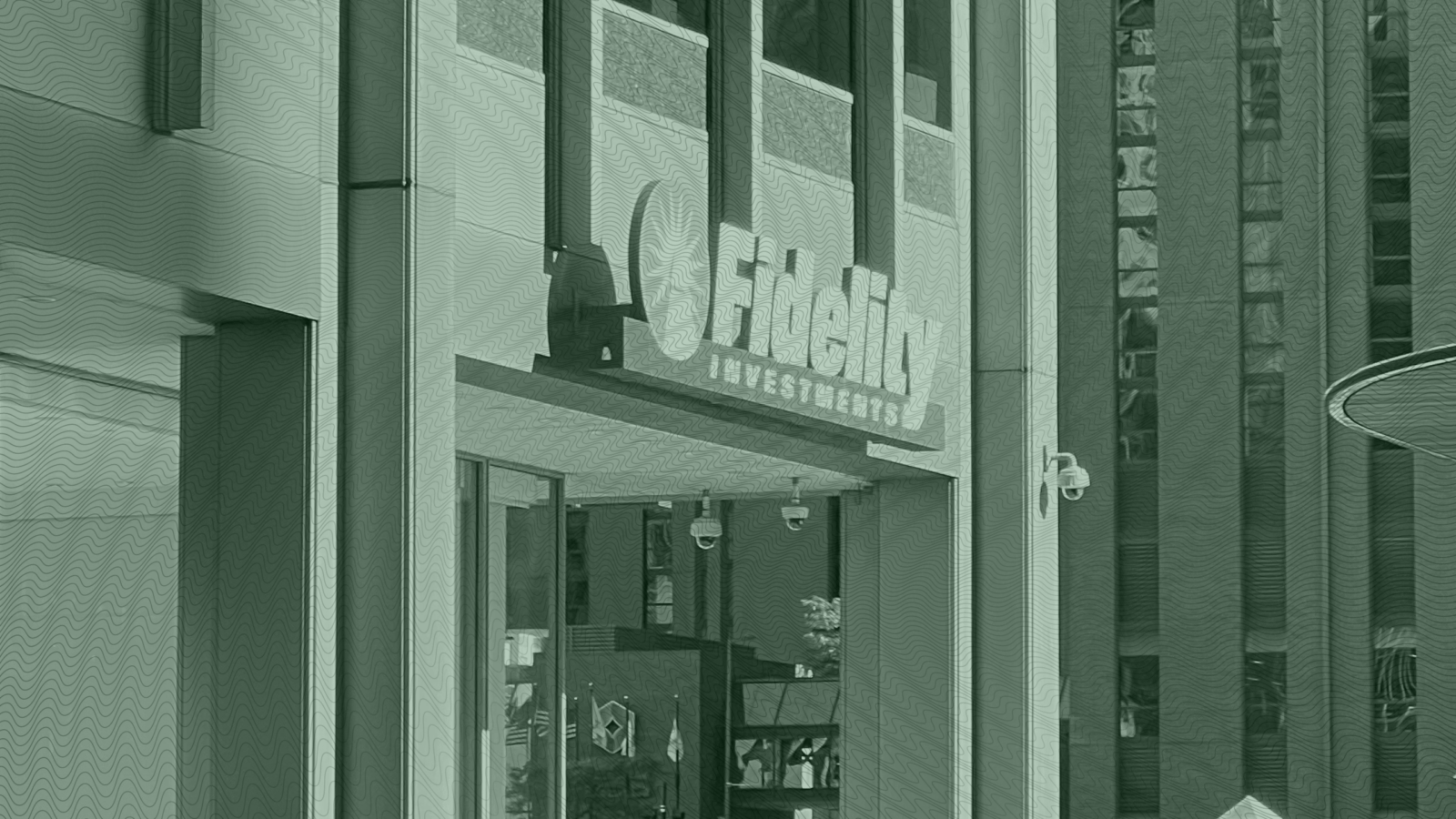Good morning.
The AI may be getting smarter than the chipmakers.
An artificial intelligence-powered ETF from Qraft Technologies — which has beaten the S&P 500 so far this year — ditched its exposure to Nvidia in August. The two weren’t always on the skids, though. The mega-cap chipmaker was among QRFT’s largest holdings since September 2019.
Before you shrug, remember Nvidia shed almost $280 billion in valuation in September, meaning the AI-powered QRFT was able to avoid the fallout from the largest single-day drop for a US company on record.
Talk about timing the perfect breakup.
What Fidelity’s Data Breach Means for Advisors

How about two years of free credit monitoring, and we call it even?
Fidelity Investments’ second data breach of the year hit customers in August, and is serving as a wake-up call for financial advisors about the threats cybercriminals pose to their businesses. The Boston-based brokerage announced last week that a hacker gained access to the personal data of more than 77,000 clients through two recently opened accounts. It’s led to a class action lawsuit.
Experts believe the perpetrator gained access to the personal information through improperly configured third-party code. With over 2,000 similar breaches this year, so-called supply chain attacks are becoming hackers’ preferred way to access protected systems, according to Yashin Manraj, CEO of the cybersecurity firm Pvotal Technologies.
Advances in artificial intelligence are also helping scammers capitalize more effectively on stolen identities, data breaches, and troves of data posted on social media. “The sophistication of AI-powered attacks will make for a challenging few years,” he said.
Fake It ‘Til You Take It
Deepfake technology is helping hackers swindle clients by cloning voices and images. These “social engineering” tactics help fraudsters trick firms or users into giving them access to their investment accounts or other sensitive data. In the past year, there has been an increase in successful hacks, Manraj said, and scammers are now using unprotected client social media accounts to create the clones.
“The rise of low-cost AIs, large language models, and automation tools has empowered scammers to widen their net … and use AI to camouflage their real identities, voice, and language,” he said. The new techniques include:
- Using AI to monitor employees, scan public records, and job descriptions, and using social media to identify potential weaknesses.
- Romance scams — there have also been at least 10 successful data breaches this year that involved one, Manraj said.
Keep It In Perspective. Fidelity said there has been no evidence the personal information has been misused, and the issue impacted a fraction of its customers. A representative for the company declined to comment.
“We should keep in mind that these incidents may sound large, but affect only a small percentage of the firm’s 51.5 million individual clients,” said John O’Connell, founder of cybersecurity firm The Oasis Group. He added that the incident appears to have been a “breachhead,” where attackers establish a foothold to launch further attacks.
Phish Food. Just last week, firms were hit with a phishing scam that attempted to imitate FINRA executives. The “ongoing” campaign included scammers sending emails posing as leaders of the regulator with a PDF attachment that could include “malicious” content, according to a FINRA cybersecurity alert.
“Individuals are more susceptible to falling for a scam if the data presented appears professional, well-thought-out, and a reasonable service that they have recently used,” Manraj said.
Frustrated With Outdated Alternatives “Platforms”?
Gridline is the leading turnkey asset management platform, specifically developed for wealth managers and multi-family offices investing in alternatives. They provide an efficient, end-to-end solution for building and managing alternative investments without the operational and administrative burden of handling everything in-house.
With Gridline, you benefit from:
- Advanced portfolio management tools to optimize your investment process and access to a diverse range of alternative investment products.
- The ability to build customized investment structures, such as funds of funds, feeder funds, and co-investments.
- Integrated reporting across your entire alternatives portfolio, ensuring clarity, control, and compliance.
Stop relying on outdated systems and discover how Gridline can elevate your alternative investment strategies.
Don’t Celebrate the 2-Year Bull Market Just Yet
The two-year anniversary of the bull market grabbed headlines last week, but it also came as a reminder that not all ETFs are created equal.
Sure, the S&P 500 keeps hitting all-time highs, up 62% over the past two years. State Street’s SPDR S&P 500 ETF Trust (SPY) is also up an impressive 68% since mid-October 2022 — that’s nearly 3% per month. Good work if you can get it, right? But the stock market can sometimes become a victim of its own success.
Not From Concentrate
Like the SPY, the Invesco S&P 500 Equal Weight ETF (RSP) has holdings in every company listed on the S&P 500. But unlike the SPY, the RSP is an equal weighted fund — and is up only 46% over the same two-year window.
That type of underperformance compared to SPY sends a different signal to clients who are expecting to beat traditional indexes. It also demonstrates a rare moment in stock market history where the popular indexes are dominated by a small number of increasingly larger stocks:
- The S&P 500 has not been this top-heavy since 2000, when the dot-com bubble burst and was followed by three straight years of steadily lower prices.
- RSP actually outperformed SPY by a margin of 17% to 6% from October 2020 to October 2022, a reminder of just how cyclical the stock market can be.
Gift Certificate. ETFs can be used as puzzle pieces to help advisors explain the many slices of the stock market to clients. For instance, dividend stocks, small-cap stocks, and non-US stocks underperformed both ETF versions of the S&P 500 the past two years. ETFs also help advisors calm clients’ fear of missing out: They often want to own what they wished they’d owned in the recent past.
That’s especially timely when headlines are screaming about a two-year bull market anniversary. For advisors, best to skip the cake and balloons, and give clients a much more valuable gift — perspective.

ETF Spotlight: Big thinking starts with quality mid-caps. Virtus KAR Mid-Cap ETF (KMID).
The Wealthtech That Quintupled Assets Year-Over-Year, Twice

The wealthtech funding bonanza is alive and well.
The latest beneficiary? The digital advisor Farther, which just last week raised $72 million in a Series C funding round. Led by Alphabet’s independent growth fund CapitalG and Viewpoint Ventures, the latest round increases the New York City-based RIA’s valuation to $542 million — that’s up from $131 million just a year ago. It’s the latest funding in a red-hot wealthtech sector that continues to attract serious capital from some of the world’s leading investment firms.
Farther Than You Could Throw Them
It’s hard to understate the company’s considerable growth since its inception in 2019. The digital advisor had pulled in about $140 million in client assets by early 2022; the company held a funding round in August of that year, and quintupled assets by the following April, according to the firm. Not to be outdone, Farther again increased assets fivefold over the past year. It now has more than $5 billion under management with more than 100 advisors and 5,000 clients.
“Farther’s rapid growth is a testament to our advisor-first culture and platform,” Farther CEO Taylor Matthews told The Daily Upside in an email. The company plans to use the fresh capital on improvements to its portal and investment resources, as well as to develop new lead-generation technology, according to a company spokesperson.
One of the keys to its success has been its tech. The company said its technology allows advisors to spend more time serving clients and prospecting for new ones, which helps bring in additional assets. Advisors at the firm also receive equity and don’t have to worry about mandatory minimums, according to Farther.
Tech It Up. The wealthtech sector is projected to reach $9.43 billion in market value by 2028, according to a recently released report. And digitally-savvy financial advisory firms are expected to benefit the most:
- Firms that integrate technology across strategy, design, and application are growing faster than traditional advisors, according to a 2024 Fidelity study.
- Advisors working with these firms reported more work satisfaction, higher compensation, and better client experiences.
CapitalG general partner Jesse Wedler said tech companies can create better environments for advisors and clients and create a flywheel effect for growth. “We spent years looking for companies with the potential to transform the wealth management industry,” Wedler said in a release. “We look forward to helping them further scale their innovative wealth management business.”
Extra Upside
- What Are You Up To? Young investors are less trusting of advisors.
- Beating Expectations: Wall Street’s biggest brokers enjoy an amazing start to earnings seasons.
- I Saw the Sign: Advisors say CFP Board’s latest ad campaign makes the profession look underworked and overpaid.
- Salaries Down: Pay on Wall Street falls for the second year in a row. It’s still a lot, though.
- Upgrade Your Alternatives Platform with Gridline. Enhance your operational efficiency, improve client engagement, and deliver superior alternative investment strategies. Explore Gridline today and get the tools to scale without added complexity.*
* Partner
Advisor Upside is edited by Sean Allocca. You can find him on LinkedIn.
Advisor Upside is a publication of The Daily Upside. For any questions or comments, feel free to contact us at advisor@thedailyupside.com.

